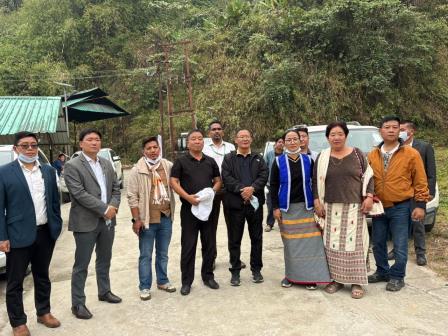-
COPU reviews state PSUs in second sitting
-
CM stresses on strong internal security, tech-driven policing
-
Cabinet approves proposals aimed at strengthening governance, enhancing public…
-
Body found hanging at bus stop with limbs tied sparks…
-
Mein chairs pre-budget consultative meeting with community based organisations
-
District level training on Census of India 2027 begins at…
-
WCD Minister reiterates commitment to safeguarding rights, dignity of…
-
Woman loses life in massive fire, two children seriously injured
-
 UA Minister inspects burial ground, focuses on maintenance and improvement
UA Minister inspects burial ground, focuses on maintenance and improvement
-
 UA Minister inspects burial ground, focuses on maintenance and improvement
UA Minister inspects burial ground, focuses on maintenance and improvement
It was only in March last this year the UN Food and Agriculture Organisation (FAO) had warned that Fall Armyworm, the deadliest pest ever to invade and destroy agricultural produces may cost Indian agriculture billions and ruin the economy which is primarily agrarian in character. After wreaking havoc in over 50 countries in Africa and Asia destroying crops, especially maize since 2016, it finally landed in India last summer and has made its destructive march to more than 10 states within this short span of a little over 10 months. When experts were thinking that Fall Armyworm would spare the Northeast, the news about its inroads in Mizoram has indeed brought deep concerns all over the region. And with its discovery by the College of Horticulture & Forestry scientists in maize cultivated in its campus for field training purposes, alarm bell has really started ringing for Arunachal Pradesh.
Invasion of pest has always been a threat to agriculture and is a concern for entire world. Having negative impacts directly on biodiversity and ecosystem processes, ultimate sufferers are human beings.It is also interesting to note how scientists have found a direct relation of pest multiplication and global warming.Research has established that global warming will increase overall pest population and create favourable habitats for them to spread and sadly the most affected will be the corps which form the staple diet of global population. Corn, rice, wheat and maize alone are staples for about 4 billion people worldwide and account for about two-thirds of the food energy intake.
It is not that India hasn’t successfully managed to control pest invasions in past ranging from a wide range of crops and although Fall Armyworm has been designated to be a formidable pest to counter, success stories of much poorer African nations suggest that it’s not that impossible a task. All strategies must be devised with full involvement of farmers who are the main stake holders, besides allotting more focus to research and development for ensuring adequate preparedness for similar future exigencies and ensuring sustainable development. And in the face of rising concern about the excessive use of pesticides including biologicals laced with chemicals as control weapons, best global practices and latest technologies availablemust be embraced.
But it is heartening that Fall Armyworm hasn’t been able to make destructive progress in Arunachal as of now and has been detected at a time when there will be adequate time to fight back. This will be a crucial time which must be spent in sensitizing the farmers of all the districts about dos & don'ts and the emergency measures to be adopted.
It’s a red alert for the state and an iota of complacency may prove costly.

Kenter Joya Riba
(Managing Editor)She is a graduate in Science with post graduation in Sociology from University of Pune. She has been in the media industry for nearly a decade. Before turning to print business, she has been associated with radio and television.
Email: kenterjoyaz@easternsentinel.in / editoreasternsentinel@gmail.com
Phone: 0360-2212313

